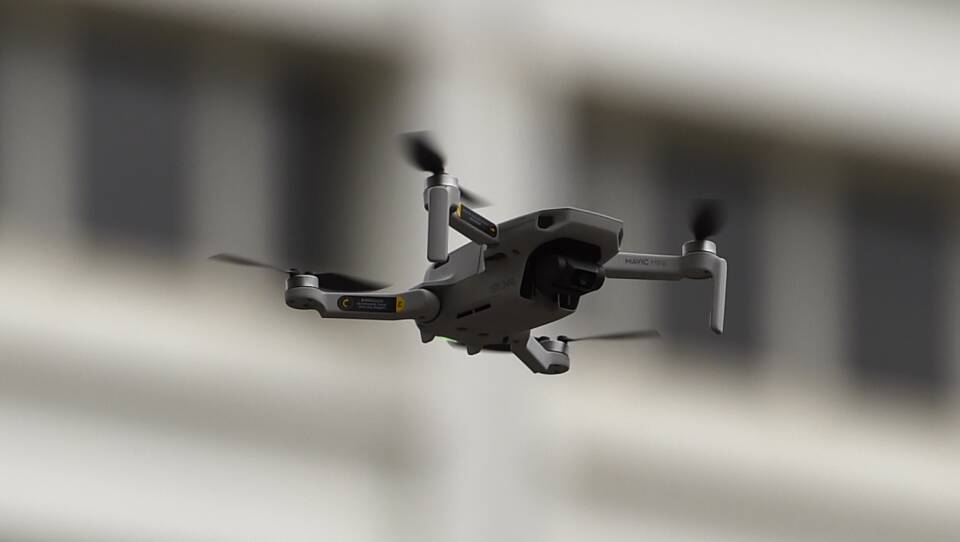Worcester officials have signed off on a police department request to buy a drone, ending three months of debate about how the device could infringe on privacy rights and sow distrust between homeless people and law enforcement.
City Council on Tuesday night voted 7-3 to approve the police’s bid for the drone. Shortly afterward, Acting City Manager Eric Batista — who has final say on the matter — confirmed to GBH News that he would move forward with the purchase now that council has supported it.
Batista acknowledged that councilors Khrystian King, Etel Haxhiaj and Thu Nguyen and some community members remain opposed to the drone due to the concerns about privacy, in particular that police could use the device to search for homeless encampments . Echoing police officials and councilors who support the drone, Batista said the device will help maintain public safety by giving law enforcement an overhead view of crime scenes and disasters.
“There’s different scenarios where it’s warranted to have this,” he said. “[If] there’s a major spill and we need to evacuate a certain area — where is that spill going — an aerial view will give us that opportunity to [find out].”
Police officials have said the remote-controlled drone will include a camera and infrared technology to detect body heat. The city will pay for the device using about $25,000 from a $100,000 earmark from the state Executive Office of Public Safety and Security, which City Council voted to accept last year. Batista said police won’t have possession of the drone for at least several months as they await its delivery.
Police drones have become increasingly common in Massachusetts, according to data obtained by the ACLU of Massachusetts . State police and law enforcement agencies that own drones include Boston, Foxborough and Northampton, among other localities.
In April, Worcester police expressed an interest in joining that list, arguing that although they currently use drones borrowed from the State Police, having their own would help them investigate crimes, respond to disasters and find missing people quicker. The department also noted the drone could assist with locating and offering outreach to homeless communities.
That immediately set off fears among several councilors and homeless advocates that the drone would violate homeless people’s privacy rights and scare them. In response, police said they wouldn't plan to use the drone against the city's homeless population. Still, several councilors requested the city create a policy governing use of the drone and prohibiting police from employing it around homeless encampments.
Since then, police, city officials and civil rights advocates have spent months debating the policy. The Worcester Police Department initially agreed to include the homeless carve-out in the policy, but then walked that back, saying the provision could “handcuff” them during emergency responses that involve homeless people. The back-and-forth prompted council to delay a final vote on the drone purchase until the police department and the city manager’s office could clarify the policy.
In the last week, Batista tried to clear up disagreement over the policy by meeting with police department officials along with a representative from the the ACLU of Massachusetts. They agreed the policy should mandate that police provide the city manager and public with quarterly updates documenting their use of the drone. They also added a provision that stipulates the drone will not be used to “harass, intimidate or discriminate against any individual or group.”
“We are keenly aware of concerns that have been raised regarding unsheltered individuals,” Police Chief Steven Sargent wrote in a June 9 memo to Batista . “Our department does not intend on using the technology to identify or locate unsheltered individuals.”
During the council meeting Tuesday, several councilors accepted the policy and said it was time to move forward with buying the drone.
“For me, father of four children, I couldn’t forgive myself if I voted against this resource that had the ability to save someone’s life,” Councilor Sean Rose said.
But other people and groups, including the ACLU of Massachusetts, remained opposed to the drone. Councilor Khrystian King said the police should instead use the money to train officers on interacting with the city’s youth. He along with councilors Etel Haxhiaj and Thu Nguyen complained that the updated drone policy still doesn’t include protections specifically for homeless people.
“I think in regards to putting in a clause, I don’t understand why we can’t put that in there,” Nguyen said.
Batista reiterated that police will not use the drone around homeless encampments, except in emergency situations. The acting city manager added the policy would be discriminatory if it singled out specific groups.
“We’re trying to set a policy that will impact everyone as a whole,” he said.







